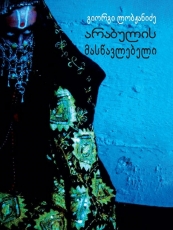A TEACHER OF ARABIC
The new poetry collection by Giorgi Lobzhanidze consists of verses written over last 8-9 years. The author, in spite of his questing nature, does not apply any cutting-edge experimental poetic means: he keeps to his general creative direction. His attitude to life, with its brutality and its beauty, is expressed by sad characteristic touches, fused with ironical, sometimes even parodied features. A rich vocabulary, deep poetic thinking and intellectual experience all together creates his poetry, which at first sight is modest but at the same time deep, multi-coloured, varied and contemporary, free from any pathetic elements. It has the ability to charm and involve the reader, for his verses are the best reflection of the spirit of our epoch. Giorgi Lobzhanidze’s poems can rarely be broken down into parts. It is hard to select lines, to quote him, because we would generally be breaking up a narrative. The narrative is either about a person’s life story, or about the views, ideas, perceptions which the author himself has and which he is then busy proving in one way or another. He rarely ‘throws out’ a short explanation or a neat metaphor. He keeps the more traditional verse structure – charging it up more and more and then coming to an emotional finale. You always sense in this collection the metaphor perceived in action in the work, as in life, and sometimes these concepts change places. The book is a re-evaluation of the author’s own work, a work in which the material and the imagined worlds coexist and come to reveal each other.
‘In his time, John Keats pointed out precisely that the imagination was a sphere by which reality found aesthetic significance: ‘The imagination may be compared to Adam’s dream – he awoke and found it truth.’ It is by this sort of phenomenon that we can define many cases of Giorgi Lobzhanidze’s poetry where the everyday is poeticised or the romantic is found in the unromantic: a prosaic family drama becomes poetry, ordinary things are presented to us under an extraordinary veil, a parody of the conventions of love lyrics or the suicide of a Shahid woman and a terrorist act are transformed into an uplifting aesthetic representation of love.’
G. Lomidze, literary critic
‘Giorgi Lobzhanidze is ordered and consistent, and his work has changed a great deal recently. His thinking has become more radical. If earlier he was inclined to be decorative in an oriental way, recently he has discovered a different sort of intensity. It may be that The Teacher of Arabic which he wrote a few years ago, or a poem saturated with love, but trust me, after that period his poems have become even more radical and ‘anti-politically correct’. Nevertheless, I should stress that this is not the first case of youthful radicalism summoned up by enthusiasm; it is the protest of a poet who has reached maturity.’
Sh. Iatashvili, poet, literary critic
EXTRACT
Translated into English by Ana Kopaliani and Tim Ketcher
SHAHADA
Kiss me bitterly,
we will not exist in the morning;
both of us will carry out our task,
we will be scattered on opposite ends of this large city
and never again manage to reunite,
we will rise skyward like smoke,
we will be scattered around,
and who knows,
maybe we’ll never meet again…
Kiss me bitterly right on the lips,
consider my whole body with your tongue,
don’t rush this,
don’t leave a single un-kissed feature,
a single rib,
because tomorrow this body will turn to dust
and the wind will take these eyes…
In case of using the information, please, indicate the source.
